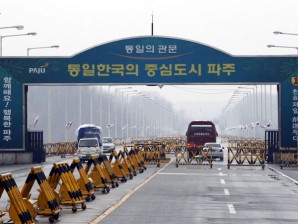
South Korean vehicles, left, return from the North Korean city of Kaesong at Unification Bridge in Paju, South Korea, near the border village of Panmunjom. AP
SEOUL, South Korea—The North Korean factory park that is the last vestige of cooperation with the South moved closer to paralysis Saturday as nearly 100 South Korean workers went home across a border that Pyongyang has closed in the return direction.
South Korean workers who left the Kaesong industrial complex just north of the heavily armed Demilitarized Zone said their companies were running out of raw materials that ordinarily would be trucked in from the South. South Korea’s Unification Ministry said one of the more than 120 companies operating at the complex shut down Saturday, the fourth to do so since North Korea barred people and cargo from entering on Wednesday.
The closing of the border crossing is among many provocative moves Pyongyang has made in recent weeks. It has also made war threats as it expressed outrage over UN sanctions related to its February nuclear test, and over ongoing US-South Korean annual military drills that Pyongyang calls war rehearsals.
Outsiders say Pyongyang is talking tough to win negotiations and aid from the US, provoke softer policies from South Korea and make young authoritarian leader Kim Jong Un appear powerful to his own largely destitute people.
North Korea last month threatened a nuclear attack on the United States, and last week said it had entered a “state of war” with South Korea. Defense officials in Seoul say they have seen no preparations for a full-scale attack, though they add that the chance of a localized conflict remains.
On Tuesday, North Korea said it would restart a plutonium reactor closed in 2007 and use it to make fuel for nuclear bombs. On Thursday, South Korea’s defense minister said the North has moved a missile with “considerable range” to its east, possibly for testing or as part of drills.
South Korea would not confirm a report from Yonhap news agency that North Korea had hidden two Musudan missiles after moving them to the east coast. A South Korean Defense Ministry official said Saturday that if the North had hidden a missile, it could be to run a technical checkup before a test launch. The official spoke on condition of anonymity, citing ministry policy.
Analysts believe the Musudan missile has not been tested, but is intended to hit targets at least 3,000 kilometers (1,800 miles) away, putting the US territory of Guam at the limits of its range.
North Korea has been raising its war rhetoric almost daily. Foreign diplomats based in Pyongyang say the government told them it could not guarantee their safety unless they left the country by April 10. There was no sign Saturday that any diplomats were preparing to leave because of the notice.
Britain’s Foreign and Commonwealth Office said Friday that it had “no immediate plans” to withdraw workers from its embassy and condemned recent North Korean behavior.
At Kaesong, hundreds of South Korean managers have worked with thousands of North Korean workers to produce a variety of products for the past decade. There was a similar disruption in 2009 — also during US-South Korean military exercises — but that was brief, and manufacturers fear this border shutdown could last longer.
The Unification Ministry said 92 South Koreans headed home Saturday. One manager interviewed as he left, Han Nam-il, said he saw North Korean security officials “fully armed” before he crossed the border.
Another man, Kim Jin-ho, said his factory had only enough raw materials to last for three or four days, as he spoke from the seat of his porter truck full of cardboard boxes.
North Korea is not forcing South Koreans to leave, so the companies are running out of raw material rather than managers. Sung Hyun-sang, head of an apparel manufacturer that employs 1,400 North Korean workers, said Friday that his factory will be “in real trouble” if supplies aren’t sent to his factory in Kaesong in a week or two.
In a sign of how unconcerned South Koreans based at Kaesong are about their own safety, the Unification Ministry said Seoul on Saturday turned away some managers waiting at the border with hopes of getting back to work.
South Korea has drawn anger from the North by discussing the possibility of a potential hostage situation involving the nearly 520 South Koreans still working at the complex. But Chang Yong-seok at the Institute for Peace and Unification Studies at Seoul National University said what the North is really doing is threatening to “wither the Kaesong industrial complex to death.”
The North Korea analyst said tension at Kaesong is likely to tone down once the US and South Korea wrap up their annual drills at the end of this month.